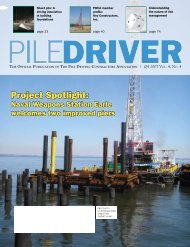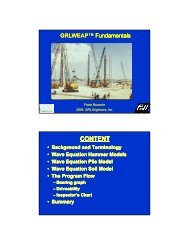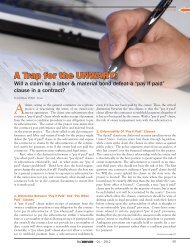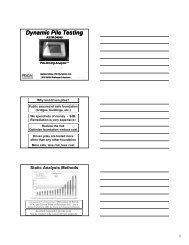Full Issue (17 MB) - Pile Driving Contractors Association
Full Issue (17 MB) - Pile Driving Contractors Association
Full Issue (17 MB) - Pile Driving Contractors Association
You also want an ePaper? Increase the reach of your titles
YUMPU automatically turns print PDFs into web optimized ePapers that Google loves.
THE BUSINESS OF BUSINESS<br />
THE BUSINESS OF BUSINESS<br />
Safety: The Universal Language?<br />
Safety:<br />
Literacy<br />
The<br />
and<br />
Universal<br />
Language<br />
Language?<br />
Challenges<br />
Literacy in the Workplace and Language Challenges<br />
in the Workplace<br />
By Mark A. Lies II and Elizabeth Leifel Ash<br />
By Mark A. Lies II and Elizabeth Leifel Ash<br />
As the American “melting pot” becomes increasingly diversified,<br />
employers face inevitable issues related to language in the<br />
As the American “melting pot” becomes increasingly diversified,<br />
workplace. Employers can no longer assume that qualified<br />
employers face inevitable issues related to language in the<br />
workers speak or write English. Employers who hire workers that do<br />
workplace. Employers can no longer assume that qualified<br />
not speak English are obligated to ensure that all employees, regardless<br />
workers speak or write English. Employers who hire workers that do<br />
of their linguistic background, receive and comprehend safety-related<br />
not speak English are obligated to ensure that all employees, regardless<br />
training. For employers whose supervisors only speak English, the<br />
of their linguistic background, receive and comprehend safety-related<br />
requirements set by the Occupational Safety and Health Administration<br />
training. For employers whose supervisors only speak English, the<br />
(OSHA) can present unique challenges. This article outlines OSHA’s<br />
requirements set by the Occupational Safety and Health Administration<br />
policies with respect to training non-English-speaking employees, and<br />
(OSHA) can present unique challenges. This article outlines OSHA’s<br />
offers recommendations for employers in assuring that all employees<br />
policies with respect to training non-English-speaking employees, and<br />
are adequately trained to work safely.<br />
offers recommendations for employers in assuring that all employees<br />
are OSHA’S adequately TRAINING trained REQUIREMENTS<br />
to work safely.<br />
Numerous OSHA standards, from lockout/tagout to forklift operation<br />
and bloodborne pathogens to hazard communication, require<br />
OSHA’S TRAINING REQUIREMENTS<br />
Numerous OSHA standards, from lockout/tagout to forklift operation<br />
and bloodborne pathogens to hazard communication, require<br />
employers to train or instruct employees in some way. OSHA generally<br />
treats its training requirements as performance-based, meaning that<br />
employers to train or instruct employees in some way. OSHA generally<br />
OSHA defers to each individual employer to fashion the most effective<br />
manner to accomplish the goal of the standard. For that reason,<br />
treats its training requirements as performance-based, meaning that<br />
OSHA defers to each individual employer to fashion the most effective<br />
manner to accomplish the goal of the standard. For that reason,<br />
none of OSHA’s training standards require employers to use particular<br />
documents, teaching methods or language to train employees. Instead,<br />
none of OSHA’s training standards require employers to use particular<br />
OSHA requires employers to present information in a manner that<br />
documents, teaching methods or language to train employees. Instead,<br />
employees are capable of understanding. For example, if an employee<br />
OSHA requires employers to present information in a manner that<br />
is not literate, the employer does not satisfy OSHA training requirements<br />
merely by telling the employee to read training materials or<br />
employees are capable of understanding. For example, if an employee<br />
is not literate, the employer does not satisfy OSHA training requirements<br />
merely by telling the employee to read training materials or<br />
review safety programs. Likewise, if an employee does not speak, read<br />
or understand English, training must be provided in a language the<br />
review safety programs. Likewise, if an employee does not speak, read<br />
employee understands.<br />
or understand English, training must be provided in a language the<br />
employee understands.<br />
REPRINTED FROM CONCRETE OPENINGS | VOL.18 | NUM.3 | SEPTE<strong>MB</strong>ER 2009

















